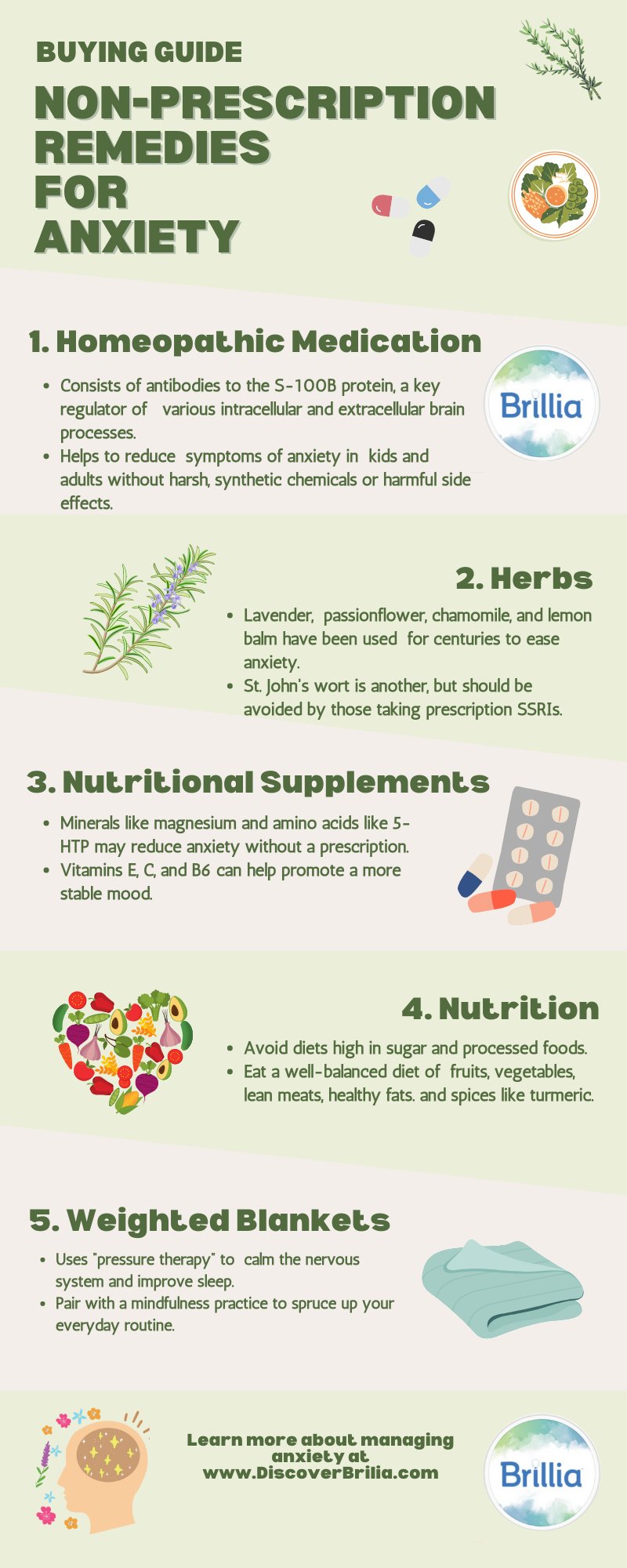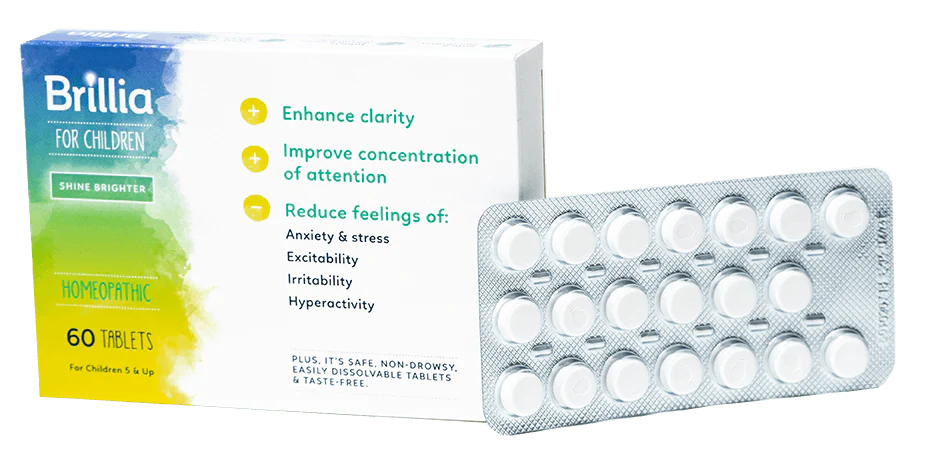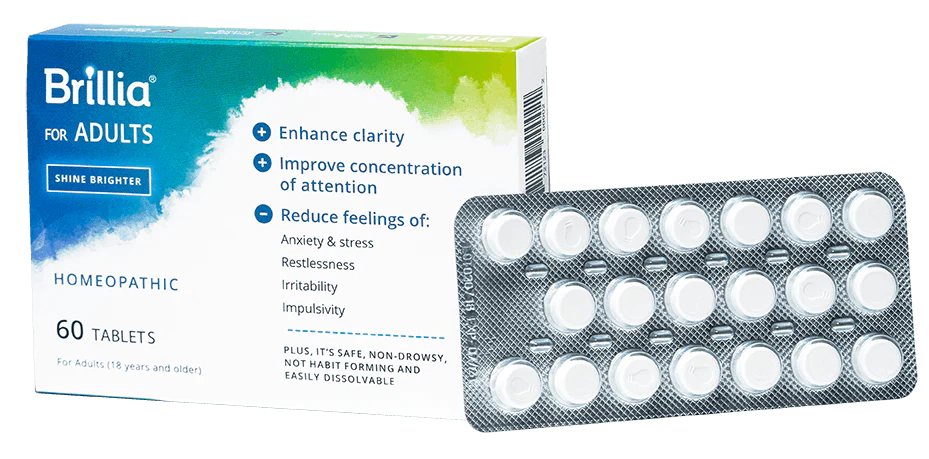Buying Guide: OTC Anxiety Meds
Even before the pandemic caused a spike in anxiety medications in 2020, these drugs were becoming increasingly more common for people of all ages.1 Whether you feel burdened by the uncertain state of the world in recent years or you’ve been struggling with anxiety for much longer, chances are you’ve considered prescription anxiety medication to cope.
But for many, the idea of committing to medication is daunting, especially if you’ve never taken it before or you’re already taking medication for ADHD. Will your doctor prescribe the right medication? What will the side effects be like? Will you have to take them forever? If you’ve ever wished for an easier method of coping with your anxiety or ADHD, you will be relieved to know that over-the-counter anxiety and ADHD medications are now emerging as safe and effective alternatives to prescription medication. To help you decide what’s right for you, let’s explore the difference between homeopathic medication like Brillia and traditional prescription medication, as well as the link between ADHD and anxiety.
How is Anxiety Typically Treated?
The two primary treatments for anxiety are psychotherapy and medication. Some people choose to combine these treatments for greater success.
Cognitive behavioral therapy (CBT) is one type of therapy for anxiety in which patients learn specific skills to change the way they think and behave during times when they are anxious and gradually revisit activities they previously avoided due to their anxiety.
Medications prescribed for anxiety include long-term usage of antidepressants approved for anxiety and anti-anxiety medications; or short-term usage of sedatives or beta blockers.
Lifestyle changes can also help reduce anxiety, such as keeping physically active, avoiding alcohol, cutting back on caffeine, and prioritizing sleep. Many individuals use relaxation techniques like mindfulness meditation, yoga, tai chi, and visualization techniques to ease anxiety in triggering situations.
OTC vs. Prescription Anxiety Medication
In the U.S., it is not possible to buy popular anxiety medications over-the-counter (OTC), such as benzodiazepines, SSRIs, or sedatives. These drugs are classified as controlled substances because of their addictive properties and potential for abuse. In fact, overdose deaths involving benzodiazepines quadrupled between 2005 and 2015 as the market for anti-anxiety drugs continues to climb to a projected $4.15 billion by 2027 in the U.S.2, 3
Aside from their danger for abuse, another issue with prescription medication is their lack of long-term efficacy. While they may provide immediate relief for some, when the side effects of such medications wear off, the user will find themselves facing the same problems again. This doesn’t just lead to potential dependency on the drug, and a reliance on increased dosages, but it may also lessen the user’s natural coping skills.
With the incidence of side effects and the potential for addiction, it makes sense that some sufferers of anxiety and ADHD might be wary of prescription drugs. But this doesn’t mean they should have to face their symptoms without help. While benzodiazepines, SSRIs, and sedatives do help many people and are the best option for some, we prefer to see the as a last resort after other gentler routes have been pursued. One such option is Brillia, which is suitable for adults, as well as children and teens.
Designed for those with anxiety, ADHD, or coexisting conditions, Brillia is medication clinically proven to reduce anxiety, restlessness, irritability, and impulsivity without harsh, synthetic chemicals or harmful side effects. Brillia is effective across a variety of diagnoses, though it does not require a prescription or an official diagnosis. Available for daily use in easy-to-dissolve tablets, Brillia can help the following symptoms of anxiety:
- Restlessness
- Stress
- Impulsivity
- Irritability
- Lack of clarity and focus
Brillia is available as an OTC anxiety medication because it does not contain any harmful or addictive ingredients. The active ingredient in Brillia consists of antibodies to the brain-specific S100 protein (S100B), which is an important regulator of various different intracellular and extracellular brain processes. By regulating the S100B protein in the body, the medication effectively helps to reduce the symptoms of anxiety and ADHD without upsetting the stomach, causing drowsiness, masking the personality, or interacting with other medications.
Learn more about how Brillia works.
Does ADHD Lead to Anxiety?
Though ADHD does not inherently cause anxiety, these two conditions are connected. Studies show that about 50 percent of adults with ADHD also suffer from anxiety, which may interfere with their ability to work, study, nurture meaningful relationships, or even fall asleep at night.4 ADHD can also worsen an anxiety disorder because of its impact on the feel-good brain chemicals dopamine and serotonin. Does ADHD medication help these debilitating symptoms? Not always. How most ADHD medication works is by stimulating the user, which can actually increase anxiety and lead to other undesirable side effects like insomnia, decreased appetite, headaches, and moodiness. Fear of added anxiety can deter ADHD sufferers from seeking help, though non-prescription medication designed for comorbid anxiety and ADHD may be the answer.
What Natural Remedies Can Help with Anxiety?
From herbal remedies like lavender and lemon balm to nutritional supplements like magnesium and 5-HTP, there are a number of natural remedies used for anxiety, with some proving to be more effective than others. In addition to lifestyle practices like meditation and mindful breathing, such remedies are typically gentler on the system and worth exploring before resorting to prescription drugs or increasing dosage of your prescribed medications. However, users should always find out if there are contraindications first. For instance, the popular supplement St. John’s wort is not recommended for those taking SSRIs like Lexapro, Prozac, or Zoloft because it can increase the amount of serotonin to dangerous levels, potentially leading to serotonin syndrome.5
Other anxiety-reducing supplements worth trying include:
- Magnesium: This mineral helps to improve brain function and modulates central and peripheral endocrine responses6
- L-Theanine: Found in black and green herbal tea, L-theanine is an amino acid that has been shown to reduce anxiety and improve sleep7
- Valerian: Thought to increase GABA in the brain, valerian has a calming and sedative effect and may improve sleep8
- Ashwagandha: A mainstay in Ayurvedic medicine, ashwagandha is an adaptogen, which reduces anxiety by interacting with the hypothalamic-pituitary-adrenal (HPA) axis and hormones, ultimately calming the body’s stress response

Common Types of Non-Prescription Anxiety Medication
Though prescription drugs continue to be a source of relief for many, we prefer to see them as a last resort, especially as over-the-counter alternatives continue to emerge as effective remedies. In the journey of deciding what the best course of action is, a homeopathic medication like Brillia is a great place to start.
Unlike many prescription drugs, the body does not develop any tolerance to Brillia, so dosage never needs to be increased and Brillia’s effects never diminish. Even more, Brillia does not have contraindications; the medication can be taken in addition to any prescription drugs to address additional symptoms or even those symptoms created by the prescribed medication. Because Brillia is an option for those who are looking for an effective alternative to pharmaceutical products, it is possible to switch to taking Brillia in the place of these pharmaceuticals once Brillia has built up in the system, which may take 2-3 weeks, or longer. However, it is recommended that users follow their doctor’s guidance if they consider coming off prescribed medication.
Though the following OTC medications are not intended for treating anxiety, they are sometimes used for this purpose:
- Antihistamines: Some people turn to antihistamines to reduce anxiety without a prescription (as an off-label use), however these medications may cause daytime drowsiness and are not intended for long-term use9
- OTC painkillers: A study out of the University of British Columbia found that acetaminophen may offer psychological relief for feelings of anxiety and social rejection, but this drug is associated with side effects like nausea, vomiting, and constipation10
Key Ingredients to Look for in OTC Anxiety Medication or Supplement
When examining the label of an OTC anxiety medication or supplement, you should look for the following factors: Effective & Backed by Science.
Is the product effective and backed by science? To determine the safety and efficacy of your OTC anxiety medication or supplement, you may have to investigate whether there are studies supporting the product’s claims.
Unlike many nutritional supplements, homeopathic medications like Brillia are strictly regulated. Homeopathic medications are required to provide substantive documentation with clinical trials and studies of the claims that the product makes, abide by FDA standards and regulations (e.g., for quality and labeling), and go through a proper registration process detailing active ingredients and inactive ingredients in order to be allowed to be sold in the U.S.
Dietary supplements, on the other hand, are not regulated by the FDA, so their safety and efficacy cannot always be validated. In many ways, these supplements are taken at your own risk. There have been cases where the FDA found hidden ingredients in dietary supplements sold on popular sites like Amazon and eBay.11
Active Ingredients
The active ingredient in your OTC anxiety medication or supplement should be clinically-validated and brain-specific, helping to balance the neurotransmitters responsible for anxiety symptoms. Some supplements may just result in a placebo effect, which can be effective for some but not for all.
If you’re unsure about the active ingredients listed in your OTC medication or supplement, it can be helpful to look into the Dietary Supplement Ingredient Directory, which was launched by the FDA in March 2023.12 This resource is designed to help the public stay informed about the ingredients used in dietary supplements. An easy search functionality allows you to look up ingredients used in products marketed as dietary supplements and find out the FDA’s view on that ingredient. You can also determine whether the agency has taken any action pertaining to the ingredient.
Antibodies to the S100 Protein
As far as being brain-specific, you already know that the active ingredient in Brillia consists of antibodies to the S100 protein (S100B) in the brain. In regulating the S100B protein and consequently lowering levels of anxiety and restlessness, the medication also normalizes the level of monoamines (dopamine, norepinephrine, serotonin) in different parts of the brain. These are the same neurotransmitters impacted by prescription anti-anxiety medications and antidepressants, but Brillia achieves this with specificity so that no other systems are affected in the body.
Why the S100B protein? Here’s what the science says:
- The S100B protein plays a crucial role in supporting serotonin-producing neurons in your brain. But S100B levels tend to be higher in patients with major depression, panic disorder, and anxiety.13
- Other studies show that the S100B protein is always up-regulated in acute stress environments. This has led to the S100B protein being a very effective neuro-inflammatory biomarker of Generalized Anxiety Disorder (GAD).14
- Antibodies to the S100B protein have been found to have anxiolytic-like activity at low doses.15
Learn more about how antibodies work for anxiety.
Shine Brighter
How to Choose the Right Anxiety Medication for You
There is no one-size-fits-all approach to dealing with anxiety, and what might work for one person may not work as well for another. Sometimes trial and error will help you find what’s best for you or your child.
While it’s true that prescription medications for anxiety can be highly effective, they may not be necessary for everyone. This is why we suggest starting with natural or homeopathic remedies and making healthy lifestyle changes first to see if you can get the support you need through these measures alone.
Safety Precautions & Side Effects
If you are curious about using any of the nutritional supplements or vitamins mentioned above, always read labels thoroughly to see if the product is safe for you, especially if you are already taking other medications or supplements. And if you experience side effects, check in with your doctor for guidance.
Keep in mind that Brillia is not associated with any harmful side effects or contraindications. The medication can be used for as long as you or your child needs support and once you stop taking it, Brillia will completely leave the system without producing any “coming” off side effects. The non-prescription medication does not leave any footprint on the system nor does it alter blood chemistry. If you are considering switching over to Brillia from your current medication, always ask your doctor first so you can do this in the safest way possible, as many prescription medications are associated with withdrawal effects.
Alternative Strategies for Anxiety Management
While prescription medication may temporarily reduce anxiety, it does not solve the underlying issues from which anxiety stems. Find out what else you can do to manage your anxiety more effectively.
Healthy Lifestyle Choices
Healthy lifestyle choices and relaxation techniques can also make a world of difference in taking control of your anxiety. According to the Mayo Clinic, improving your sleeping habits, increasing social support, and even getting regular exercise may help.16 In fact, numerous studies and meta-analyses have shown that exercise is associated with reduced anxiety in clinical settings due to its impact on a number of biological and psychological mechanisms.17
For even more help at home, some individuals find anxiety relief with simple self-care rituals, such as using a weighted blanket, or even making small home decor changes to make your home an anxiety-free space.
Therapy
You may also find it helpful to speak to a counselor or therapist about why you’re experiencing anxiety in the first place. The most common types of therapy for anxiety include cognitive behavioral therapy (CBT) and interpersonal therapy.
With CBT, a therapist helps you identify and challenge negative thoughts you hold about yourself and the world around you to alter problematic behavioral and thought patterns and address mood disorders. Some research shows that this type of therapy may actually be more effective than some psychiatric medications.18
Interpersonal therapy is a highly-structured type of therapy that aims to resolve interpersonal problems and symptomatic recovery with a time-limited approach. A therapist trained in this form of therapy will focus on improving your relationships and your social skills while providing practical strategies for managing anxiety symptoms.
Brillia’s 5 Pillars
Brillia’s 5-Pillar methodology consists of a variety of healthy lifestyle factors, which all work in tandem to reduce anxiety for long-term relief. These factors include getting adequate sleep, limiting screen time, following a nutritious diet, and practicing mindfulness and relaxation techniques. Together, these healthy lifestyle choices along with Brillia’s targeted ingredients present a holistic plan anxiety sufferers don’t have to feel anxious about or even ask their doctor about.
Find more resources about managing anxiety at the Brilli(ance) Resource Center.








